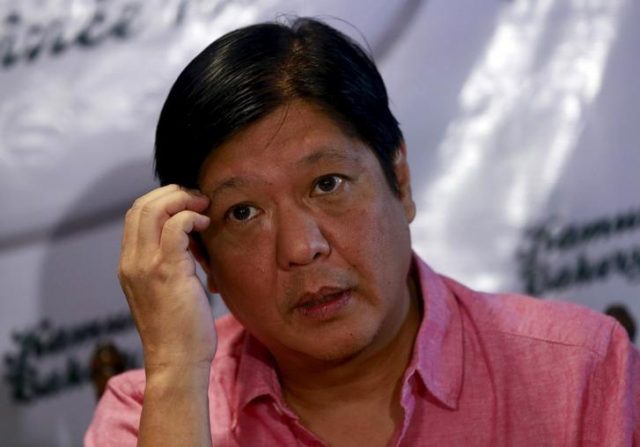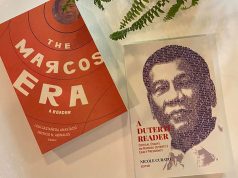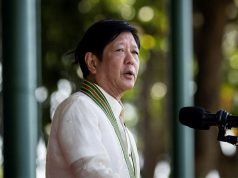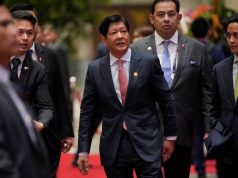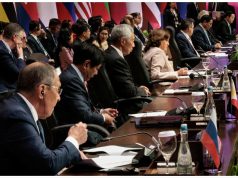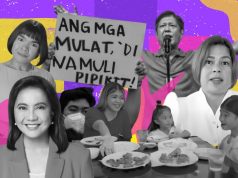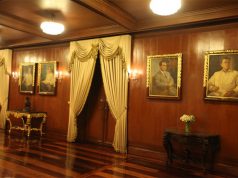MANILA, Philippines — Former senator Ferdinand Marcos says that while he and his family are now open to enter into a settlement agreement with the Duterte administration concerning their wealth, the Marcoses will not ask immunity in exchange for the deal because they didn’t do anything wrong.
“No, no. It’s a settlement. We’re talking about settlement. We’re not asking for (immunity). Wala naman akong kasalanan eh [I did not commit a sin]. I didn’t do anything wrong. I did not commit any crime. What we’re saying is we’re settling the case,” said Marcos on Thursday, during a press conference at the Kamuning Bakery Cafe in Quezon City, when asked if he would demand immunity from prosecution in relation to the proposed settlement.
But when he further explained his answer by citing an example, the issue apparently became muddled as it was not clear from his statement whether they would not ask for immunity from suit as he mentioned that the settlement they wanted would not involve filing of cases.
“What we are saying is, we are settling the case…Adjudication tayo. We’re fighting over a piece of land, we get an adjudicator to come in. What they decide, settled na tayo, agreed ka, agreed ako, tapos na, wala nang kaso [we are already settled, you agreed, I agreed, then there would no longer be a case].
“You don’t file against me, I don’t file against you. Tapos ang kaso [Case is closed],” he added.
In the statement above, Marcos also mentioned about adjudication or the formal giving or pronouncing of a judgment or decree in a court proceeding.
If the settlement would involve adjudication, would this mean that there would still be legal proceedings concerning the wealth of the Marcoses? That they would accept whatever ruling the judge would make even if it is against them and after such decision, the parties would no longer take legal action against each other?
Last month, President Rodrigo Duterte also said the Marcoses did not ask for immunity in exchange for returning their wealth to the government, which Marcos critics, including former Commission on Human Rights chair Loretta Ann Rosales, praised, saying returning the assets was tantamount to the Marcoses admitting that the wealth wasn’t theirs as nobody would offer to give back something he or she didn’t own.
But the President said, “If I were the Marcoses, if I would return that wealth, I would advise them, ‘Ask for immunity.'”
“Otherwise, keep the God damn money because you might go to jail. If you give them immunity, fine. If you don’t give them immunity, fine. But they might not return any money. Then you’ll have to look to the ends of the earth to get them,” he added.
How much will be returned?
How much of the Marcoses’ wealth would be returned to the government? Bongbong couldn’t say on Thursday as he said the one having “sporadic” talks with the President regarding the settlement offer was his sister, Ilocos Norte Governor Imee Marcos.
Asked during the press conference how much of the Marcoses’ wealth is currently under litigation, Bongbong didn’t give any figures.
“Wala, wala [No, no], we, the Marcos family, are not parties anymore ‘yong ginagawa ng PCGG [to what the Presidential Commission on Good Government is doing], it’s already with the government,” he said.
Asked again what part of wealth of the Marcoses were they willing to return, Bongbong replied:
“I don’t know. Look, first, I’m not privy to the conversation. All I know is that I have expressed the same position that the family has held since 1986 — that we have identified whatever belongs to the family, the provenance of those assets, properties whatever they maybe.”
Bongbong added, “And if the government is saying na may tinatago pa kami [that we are still hiding more], we will help you find it and you can have it, quitclaim nga eh.”
Perhaps, the question related to this statement is: Why help the government find it, as if you also don’t exactly know where it is?
And if for instance, the government has already found the wealth and has evidence to back up its claim that it belongs to the Marcoses but the family denies owning the asset, then the government won’t be able to pursue claiming it from the family or would have a difficult time doing so because the wealth allegedly does not belong to the Marcoses but to another person or family.
In the last three decades, the government, through the PCGG, was able to recover from the Marcoses and their associates a total of P170 billion.
Additionally, the PCGG continues to pursue the alleged ill-gotten wealth of the Marcoses and their associates worth P32 billion through 19 civil cases that remain pending over the past 10 or 20 years before the Sandiganbayan.
There were estimates that the alleged total Marcos loot could be between $2 billion and $10 billion.
But up to now, nobody is sure just really how much it is. The PCGG, according to insiders, continues to receive reports about the alleged illegal assets of the Marcoses that remain unrecovered.
Four years ago, financial records unearthed by the International Consortium of Investigative Journalists showed that Imee Marcos and her children were among the beneficiaries of Sinta Trust, which was formed in 2002 in the British Virgin Islands.

